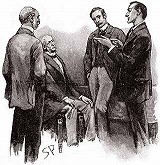Sherlock Holmes laughed heartily. “We will come to that in its turn,” said he. “I will lay an account of the case before you in its due order, showing you the various points which guided me in my decision. Pray interrupt me if there is any inference which is not perfectly clear to you.
“It is of the highest importance in the art of detection to be able to recognize, out of a number of facts, which are incidental and which vital. Otherwise your energy and attention must be dissipated instead of being concentrated. Now, in this case there was not the slightest doubt in my mind from the first that the key of the whole matter must be looked for in the scrap of paper in the dead man’s hand.
“Before going into this, I would draw your attention to the fact that, if Alec Cunningham’s narrative was correct, and if the assailant, after shooting William Kirwan, had instantly fled, then it obviously could not be he who tore the paper from the dead man’s hand. But if it was not he, it must have been Alec Cunningham himself, for by the time that the old man had descended several servants were upon the scene. The point is a simple one, but the inspector had overlooked it because he had started with the supposition that these county magnates had had nothing to do with the matter. Now, I make a point of never having any prejudices, and of following docilely wherever fact may lead me, and so, in the very first stage of the investigation, I found myself looking a little askance at the part which had been played by Mr. Alec Cunningham.

“And now I made a very careful examination of the corner of paper which the inspector had submitted to us. It was at once clear to me that it formed part of a very remarkable document. Here it is. Do you not now observe something very suggestive about it?”
“It has a very irregular look,” said the colonel.
“My dear sir,” cried Holmes, “there cannot be the least doubt in the world that it has been written by two persons doing alternate words. When I draw your attention to the strong t’s of ‘at’ and ‘to,’ and ask you to compare them with the weak ones of ‘quarter’ and ‘twelve,’ you will instantly recognize the fact. A very brief analysis of these four words would enable you to say with the utmost confidence that the ‘learn’ and the ‘maybe’ are written in the stronger hand, and the ‘what’ in the weaker.”
“By Jove, it’s as clear as day!” cried the colonel. “Why on earth should two men write a letter in such a fashion?”
“Obviously the business was a bad one, and one of the men who distrusted the other was determined that, whatever was done, each should have an equal hand in it. Now, of the two men, it is clear that the one who wrote the ‘at’ and ‘to’ was the ringleader.”
“How do you get at that?”
“We might deduce it from the mere character of the one hand as compared with the other. But we have more assured reasons than that for supposing it. If you examine this scrap with attention you will come to the conclusion that the man with the stronger hand wrote all his words first, leaving blanks for the other to fill up. These blanks were not always sufficient, and you can see that the second man had a squeeze to fit his ‘quarter’ in between the ‘at’ and the ‘to,’ showing that the latter were already written. The man who wrote all his words first is undoubtedly the man who planned the affair.”
“Excellent!” cried Mr. Acton.